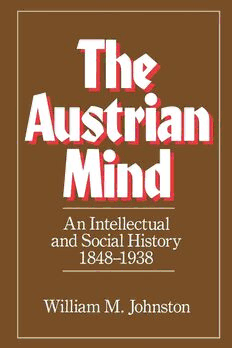
The Austrian Mind: An Intellectual and Social History, 1848–1938 PDF
Preview The Austrian Mind: An Intellectual and Social History, 1848–1938
The Austrian Mind AN INTELLECTUAL AND SOCIAL HISTORY 1848.1938 t Architecture of the 1880's along Vienna's Ringstrasse, looking across Parliament toward Town Hall and the university. Jhe AN INTELLECTUAL Austrian AND SOCIAL HISTORY Mnd 1848-1938 WILLIAM M. JOHNSTON UNIVERSITY OF CALIFORNIA PRESS BERKELEY LOS ANGELES LONDON University of California Press Berkeley and Los Angeles University of California Press, Ltd. London, England Copyright © 1972 by The Regents of the University of California California Library Reprint Series Edition, 1976 First California Paperback Printing 1983 ISBN 0-520-04955-1 Library of Congress Catalog Card Number: 75-111418 Designed by Wolfgang Lederer Printed in the United States of America 1 2 3 4 5 6 7 89 Magistris, Amicis, Discipulisque Etwas Neues kann man nur finden, wenn man das Alte kennt. One can find something new only if one knows the old —Jean Gebser URSPRUNG UND GEGENWART Preface This volume will, I earnestly hope, stimulate—or as the case may be, irritate—future researchers into reexamining the entire range of mod- ern Austrian thought. To facilitate further study I have included bio- graphical sketches together with bibliographies for nearly every major figure discussed. In passing, mention is made of many less conspicuous figures who deserve renewed attention. Throughout, my intention is to open up this long-neglected field, not to foreclose it. A word about usage is in order. In presenting quotations, I have included in the footnotes—and sometimes in the text—the German original for nearly every passage quoted. Translations are my own except where otherwise noted. Perhaps to the dismay of those who do not read German, I have not translated book titles. The context will, I hope, indicate the subject of such books. I have cited place names by their German equivalents except for standard anglicizations such as Vienna, Prague, or Styria. A book of this scope distills its author's entire experience. It would be futile to enumerate conversations, lectures, readings, or travels that inspired one passage or another. Yet, I owe a special debt to those Austrian intellectuals who encouraged the enterprise at its inception. During 1966-1967 Professor Werner Haas, now of Ohio State University, stimulated my interest in Austria—with consequences that he little imagined. During the summer of 1967 at Vienna, I was privileged to talk with Professor Franz Theodor Csokor (d. 1969), Professor Friedrich Heer, Professor Ernst Florian Winter, Dr. Viktor Siichy, and Ernst Fischer. At Budapest I conducted memorable inter- views with Professor Antal Mádl and Professor Georg Lukács (d. 1971). The views of these scholars broadened and sharpened my own, while inciting me to renewed effort. During the fall of 1967 I conversed in New York with Professor Ernst Waldinger (d. 1970), and later I corresponded most fruitfully with Professor Ludwig von Bertalanffy, now at the State University of New York at Buffalo. Repeatedly Professor Werner Stark of Fordham University bolstered my enthusiasm with discerning suggestions. Pro- fessor Robert A. Kann of Rutgers University offered incisive advice once he had completed his duties as chairman of the Jury for the Austrian History Prize. Finally, each of two unknown readers for the University of California Press left a far-reaching imprint on the book. viii PREFACE All illustrations come from the Bildarchiv of the österreichische Na- tionalbibliothek, Vienna. While preparing the first drafts, I enjoyed invaluable support from the University of Massachusetts Graduate School. A research grant, authorized by Edward C. Moore, then dean of the Graduate School, sustained me when all other sources of financial aid had failed. Throughout, my wife has exemplified, as only she can, the wisdom of George Eliot's statement, "Those who trust us educate us." W. M. J. Amherst, Massachusetts Contents Introduction 1 Objectives and Obstacles of Austrian Intellectual History PART ONE 1. From Baroque to Biedermeier 11 Habsburg From Origins of the Habsburg Empire to Baroque Faith in Providence Bureaucracy: Inertia Josephinism as a Fount of versus Both Liberalism and Conservatism Reform Biedermeier Culture as a Seedbed Of Later Attitudes The Intellectual Preeminence of Jews: Its Roots in Tribal Tradition and Gentile Rejection 2. The Emperor and His Court 30 The Longevity of Fragility: The World of Security and Its Cassandras Emperor Franz Joseph: Biedermeier Monarch in an Industrializing World Aristocracy and Lesser Nobility: Privilege as a Check on Innovation 3. An Empire of Bureaucrats 45 Uniformity Versus Venality in an Antiquated Bureaucracy X CONTENTS The Mixed Blessing of a Peacetime Army A State Church Calls Anticlericals The Municipal Socialism of Karl Lueger Schools and Universities: Immersion in Tradition as Training for Genius Twilight at Vienna: Intellectual Innovation Amid Economic Ruin 4. Economists as Bureaucrats 76 Karl Pribram's Terminology for the Transition from Feudalism to Capitalism Carl Menger's Psychological Theory of Economic Needs Friedrich von Wieser as Advocate of a Mixed Economy Joseph Schumpeter: Disinherited Heir of the Habsburg Empire Affinities Between the Austrian School of Economics and Josephinist Bureaucracy 5. Legal Theorists 88 Authority of the State Challenged and Abetted by Theorists of Law Eugen Ehrlich as Champion of Local Custom Anton Menger: Utopian Critic of Private Law Hans Gross: Pioneer of Scientific Crime Detection Hans Kelsen's Pure Theory of Law: The Political Impotence of Theoretical Rigor 6. Austro-Marxists 99 Viktor Adler: Organizer of Austrian Socialism Tactical Blunders by a Theoretician: Otto Bauer Karl Renner: The Austro-Marxist as Conciliator Max Adler's Synthesis of Kant and Marx
